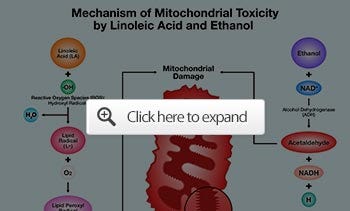Alcohol Raises Dementia Risk at Every Level of Drinking
Description
STORY AT-A-GLANCE
A study found that alcohol raises dementia risk at every level of drinking, overturning decades of claims that moderate use protects your brain
Even light drinking damages neurons, disrupts mitochondrial energy production, and accelerates brain aging, showing there is no safe dose for cognitive health
Genetic data revealed that for every measurable increase in alcohol consumption, dementia risk rose by about 15%, with the danger extending across all age and ancestry groups
Alcohol and linoleic acid (LA) from seed oils follow the same toxic pathway in your liver, creating harmful aldehydes that cause mitochondrial damage and fatty liver disease, both of which impair brain function
Reducing or eliminating alcohol and cutting seed oils to under 5 grams per day — ideally 2 grams — support liver recovery, restore mitochondrial function, and protect long-term brain health

For decades, people have been told that a glass of wine a day protects your brain. That belief is now collapsing under the weight of new evidence. A comprehensive study — tracking more than half a million adults across the U.S. and United Kingdom — shows that alcohol harms your brain at every level of consumption.1
Dementia is a progressive disease that steals memory, reasoning, and independence. While genetics and aging play a role, lifestyle factors are increasingly recognized as major drivers — and alcohol use stands out as one of the most damaging. Even light drinking is now linked to measurable brain injury.
Instead of protecting cognition, alcohol impairs mitochondrial energy production, damages neurons, and accelerates the biological aging process that leads to dementia. The truth is simple: there’s no safe amount of alcohol when it comes to preserving your brain. This evidence marks a major shift in understanding — one that replaces decades of wishful thinking with hard data.
Genetic Evidence Confirms That Every Drink Raises Dementia Risk
For a study published in BMJ Evidence-Based Medicine, researchers analyzed data from 559,559 adults aged 56 to 72 to uncover how drinking affects long-term brain health.2 These participants were followed for up to 12 years, with 14,540 developing dementia during the study.
The research combined traditional observational data with a genetic method that uses people’s DNA to reveal whether a behavior actually causes disease rather than just correlates with it. This powerful approach allowed scientists to separate cause from coincidence.
The findings overturned decades of public health messaging — Earlier studies had suggested a U-shaped curve — meaning moderate drinkers supposedly had lower dementia risk than both heavy drinkers and abstainers. This new analysis proved that pattern was misleading.
<label class="hide-text" contenteditable="false">Text within this block will maintain its original spacing when published</label>When genetic data were included, the U-shape flattened into a straight, upward slope: the more alcohol people consumed, the higher their dementia risk became. Light drinking offered no protection at all. Alcohol is not a nutrient or a tonic. It’s a neurotoxin that gradually undermines memory, mood, and cognition.
Researchers found that every level of drinking increased risk — Using genetic proxies for lifetime alcohol intake, they discovered that for every standard deviation increase in drinks per week — a statistical term meaning a measurable rise in consumption — dementia risk rose by 15%.
<label class="hide-text" contenteditable="false">Text within this block will maintain its original spacing when published</label>Even small increases in alcohol use disorder prevalence, such as a twofold rise, led to a 16% higher risk of developing dementia. This means that even a few extra drinks a week have measurable consequences on your brain health.
The illusion of safety in moderate drinking was caused by reverse causation — People in early stages of dementia often begin drinking less as their brain function declines. When studies compared them with healthy moderate drinkers, it looked like those who drank lightly were healthier — but in reality, their lower risk had nothing to do with alcohol.
<label class="hide-text" contenteditable="false">Text within this block will maintain its original spacing when published</label>It was simply that those already showing symptoms of cognitive decline had stopped drinking. This false signal distorted decades of research and led millions to believe that moderate alcohol intake was harmless, even beneficial.
The research also revealed who is most at risk — Across European, African, and Latin American ancestry groups, those with alcohol use disorder consistently showed elevated dementia rates. People drinking more than 40 drinks per week faced the steepest risk, but even those drinking far less weren’t exempt. In both men and women, genetic risk for heavier drinking predicted higher dementia incidence, demonstrating that the danger spans all populations.
Alcohol’s Brain Effects Have Far-Reaching Public Health Implications
Based on their findings, the scientists estimated that cutting alcohol use disorder rates in half could lower dementia cases by roughly 16% globally. This doesn’t just apply to people with heavy drinking habits — it means that any reduction in alcohol intake, even among light drinkers, could meaningfully protect brain health. This translates into a simple yet powerful form of prevention: every skipped drink matters.
Even occasional drinking poses measurable risks — The idea that “just a glass or two” is harmless doesn’t hold up under genetic scrutiny. Every sip increases the burden of oxidative stress and neuronal injury. Alcohol’s impact is cumulative, meaning that damage adds up over years, not weeks.
<label class="hide-text" contenteditable="false">Text within this block will maintain its original spacing when published</label>This makes it especially dangerous for younger adults, who may not notice effects until midlife. The findings strongly suggest that if you want to preserve your mental clarity into older age, lowering or eliminating alcohol is one of the most effective steps you can take.
Your choices today shape your cognitive future — Whether you drink socially, occasionally, or regularly, this research shows that the dose-response curve for alcohol and dementia risk has no safe zone.
<label class="hide-text" contenteditable="false">Text within this block will maintain its original spacing when published</label>The higher the intake, the greater the damage. If you’ve believed that “a little” alcohol supports health, it’s time to rethink that narrative. Your brain’s longevity depends on protecting its cells from preventable harm — and alcohol is now proven to be a direct and avoidable threat.
Alcohol and Linoleic Acid Follow the Same Toxic Pathway in Your Liver

It’s not only your brain that’s at risk from excess alcohol — your liver is also affected. While most people know alcohol destroys your liver, few realize that <a href="https://articles.mercola.com/sites/articles/a





